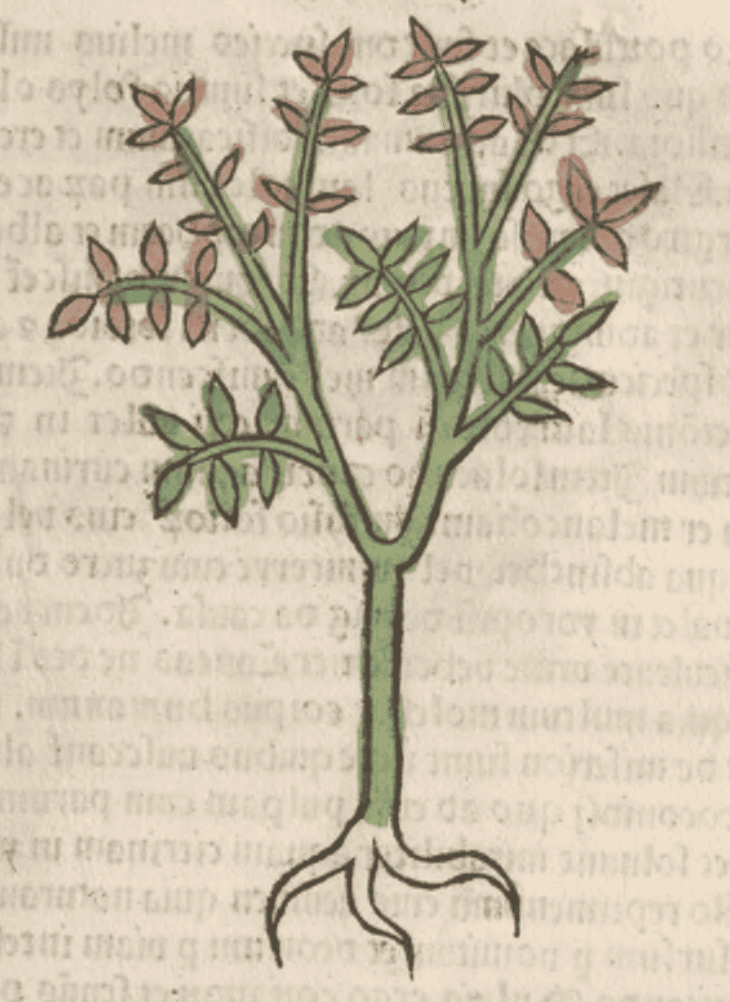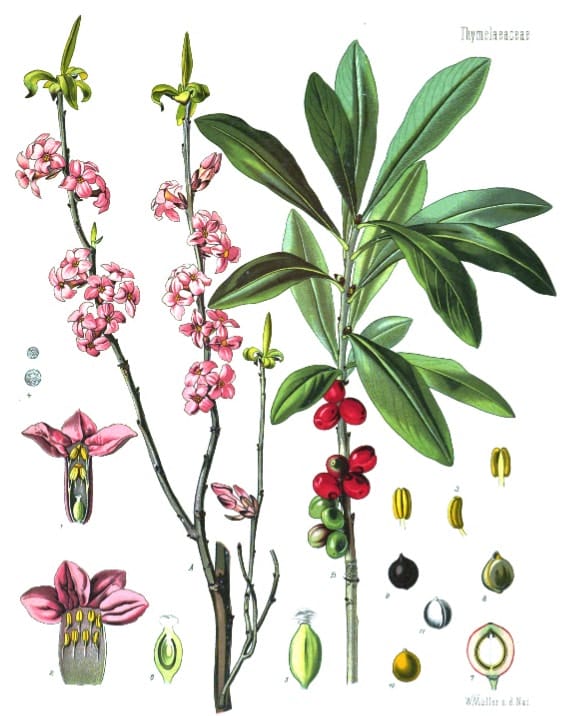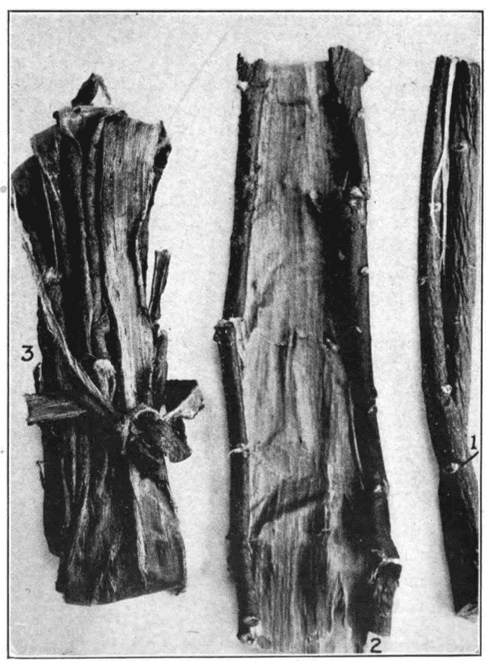Mezereon, Spurge Olive; Laureola, Spurge LaurelMezereon: Daphnoides Chamaelaea, Thymelaea, ChamaedaphneBark: Cortex Coccogniddii –Mazariyun (Arabic) Berry: Bacca Coccogniddii, Grana Cnidii, Cocci Cnidii |

|

|
 Herbarius latinus, Petri, 1485
Herbarius latinus, Petri, 1485 Daphne mezereon
Daphne mezereonKohler’s Medizinal Pflanzen, 1887
 MEZEREUM ROOT-BARK
MEZEREUM ROOT-BARK1, Outer surface showing prominent lenticels. 2. Inner smooth satin-like surface.
3. Small bundle formed by folding the bark lengthwise and tying with pieces of the bark.
Notes on Pharmacognosy, Otto Augustus Wall, 1902
Botanical name:
Daphne spp.
- D. oleoides (syn. D. mezereum).
- In England the bark of D. laureola (Spurge Laurel) has been used
- In France, the bark of D. gnidium was commonly used
Parts used:
Bark (rarely the leaf)
Fruit: see Daphne gnidium
Temperature & Taste:
Hot, dry. Pungent, Sweet. Toxic
Classifications:
Preparers and Purgers of Melancholy
Uses:
1. Purges Phlegm and Water:
-small-to-moderate doses are diuretic, full doses pass water via the bowels
-Edema, fluid retention
-purges Melancholy
-used to help Expel Worms
2. Clears Wind and Damp, Resists Poison:
-Chronic skin diseases especially weeping Eczema with severe itching; Psoriasis and Leprosy
-venereal diseases
-Rheumatism
3. Strongly Promotes Menstruation, Expels a Dead Child:
-Amenorrhea
-previously to induce Abortion and expel a Dead Child.
4. Externally:
-fresh bark is vesicant
-decoction is used as a wash to stimulate and excoriate the skin and promote discharge
-the tincture in vinegar is applied to chronic ulcers
-applied to toothache
Dose:
1. Prepared with Vinegar for internal use.
2. Boiling lessens their strength.
3. Only used in compounds where it is corrected.
4. Dose always begins small, increasing as needed.
Of the Bark in Decoction: half dram (taken over the course of the day)
10–12 grains of the bark or leaf in infusion purge (leaf sometimes work as an emetic in this dose too)
The Decoction as an alterative in venereal lymph nodes:
‘a decoction of an ounce of the fresh cortical part in a gallon and a half of water (the boiling being continued till half a gallon is wasted, and an ounce of sliced liquorice added towards the end) may be taken to the quantity of half a pint four times a day, is not nauseous to the taste, and has not been found to disagree with any stomach or constitution, or to remarkably increase any of the secretions’. (An Experimental History of the Materia Materia, Lewis, 1784)
Used in this dose, it is an alterative, cleansing the Blood and Lymph without acting as a strong purgative
Corrective:
Licorice
Preparation:
1. Leaf or Bark were sometimes steeped in Vinegar to prepare. This is far better for internal use, reducing toxicity while increasing the Phlegm-resolving effect.
2. Some formulas called for Mezereon to be steeped in wine, then dried.
Main Combinations:
1. Alterative in Skin diseases, Venereal diseases, Rhematism:
i. Mezereon with Sarsaparilla
ii. Mezereum, Bittersweet, Burdock, Licorice
iii. Mezereum, Sassafras, Guaiacum, Licorice, Coriander seed
2. Scrofula:
i. Mezereon with Figwort, Guaiacum
ii. Mezereon with Asparagus root, Polypody, Violet root, Marshmallow, Orris, Tragacanth, Black Hellebore, Calamus, Figwort, Cumin
iii. Mezereon bark with Gold (chloride), Gentian, Foxglove leaf, Bitter Orange peel. (Memorial Pharmaceutique, 1824)
3. Mercury poisoning, Mercurialism, Guaiacum, China root, Sassafras, Mezereon bark, Licorice; decoct. (Sobernheim, 1840)
4. Rheumatism and Gout:
i. Mezereon with Bittersweet and Burdock root (Hecker)
ii. Yellow Dock with Guaiacum, Mezereon bark, Meadowsweet, Cleavers, Yarrow Celery seed (Wonders in Weeds, W. Smith)
5. Ascites, serious Edema:
i. Pills made with Rhubarb and a little Mezereon added were given once weekly. (Wirtzung)
ii. Mezereon, Calamint, Spikenard (Syrian ‘Book of Medicine’)
iii. Mezereon, Squill, Gum Ammoniac, Sagapen, Agrimony
iv. Mezereon with Endive seed, Chicory seed, Lettuce seed, Celery seed, Fennel seed, Parsley seed, Rhubarb, Agaric
v. Mezereon (steeped in wine and dried), Convolvulus, Dodder (1 dram each), Aniseed, Pock Parsley seed, Hellebore (½ dram each) (Syrian ‘Book of Medicine‘, Budge, 1913)
Major Formulas:
Antimoron (Nicholas)
Wine for Scrofula (Renodeus)
Indian Electuary (Unani)
Pills for Ascites (Renodeus)
Pills of Mezereon Major (Mesue)
Compound Decoction of Sarsaparilla
Sarsaparilla, cut and bruised 100 grams
Sassafras 20 grams
Guaiacum wood, rasped 20 grams
Licorice, bruised 20 grams
Mezereum, cut and bruised 10 gram
Water, a sufficient quantity to make 1 liter.
This is used as an alterative for Syphilis, Scrofula, Skin and Rheumatic diseases in a dose of 3–6 oz. (King’s American Dispensatory)
Cautions:
1. Avoid use in the young, old, pregnant and weak
2. Full doses can cause vomiting and purging
3. Toxic in overdose.
Antidote:
Oregano
